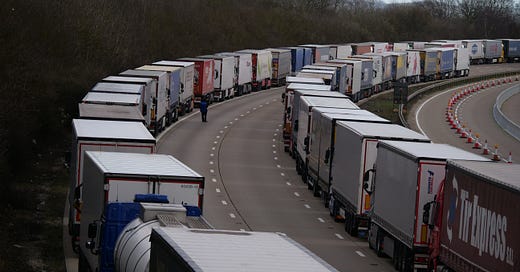Podcast: "It was there like the air was there"
Peter Foster on 'What Went Wrong With Brexit: And What We Can Do About It'
“Most people don’t move things and make things; they consume things. They just assume that supermarkets are full. They don’t really understand how this stuff happens,” says Peter Foster, the author of What Went Wrong With Brexit: And What We Can Do About It published today. “That’s one of the things about Brexit. None of us really - because it was there like the air was there - understood how the single market operated and we’ve had a lesson in that in reverse via Brexit … People have a sense that it’s not gone that well but they don’t often understand why”.
Listen to the podcast on …
New Books Network (Megaphone)
Apple
Spotify
It’s been more than three years since Britain withdrew from the EU and not even Brexiters think it has gone well so far. Defending the cause after yet another Brexit setback, the best believer Matthew Lesh from the Institute of Economic Affairs could offer was: “Brexit simply means that British representatives can make … choices, not that they must point in any particular direction”.
As Peter Foster’s new book makes clear, this is a fantasy. Bit by bit, this “trade deal in reverse” is either locking business - especially small business - out of its largest market or forcing it to develop a separate logistical presence in the EU and leaving deep scars across the economy. He offers palliative solutions to Brexit’s most injurious effects but nothing short of a return to the single market, a locked tariff schedule and a customs cooperation agreement can provide a cure. And that’s not even taking account of the political and diplomatic damage done over the past seven years.
Could the election of a Labour government next year repair the damage, I asked him. Keir Starmer may have ruled out the obvious solutions for his first term but does he have a tacit agenda for his second?
"The primary focus and the defensive posture of the Labour Party is about not upsetting the ‘Red Wall’ voters who voted for Brexit,” he tells me. “That, I think, is the be-all and end-all of it. I don't think anybody can talk sensibly about second terms and, where they do, that's usually to fob off people who would like the Labour Party to be more proactive in fixing our relationship with the EU ... One of the dangers of this idea of 'let's do something in the second term’ is that, if you're not careful, by the time you get to the second term - that's another five or six years from now - there's going to be not that much left to save. Relationships have a half-life ... What concerns me is that this kind of very defensive, shut-down-all-discussion approach by the Labour Party leadership is doing absolutely nothing to roll the pitch, as it were, for a deeper discussion post-election about what we should do to mend our relationship with the European Union … And I suspect that a hard-pressed, newly elected Labour government with lots to worry about and no money to spend will quite quickly get cold feet once it comes under pressure”.
Since 2020, Peter Foster has been the Financial Times’s public policy editor and writer of its Britain After Brexit newsletter. Previously, he reported for The Telegraph in New Delhi, Beijing, and Washington before serving as its Europe Editor between 2015 and 2020. Along with RTÉ’s Tony Connelly, he became the indispensable Brexit reporter.
For my Writers’ Writers tip sheet, he chose The Light that Failed: A Reckoning by Ivan Krastev and Stephen Holmes (Allen Lane, 2019) and The Road by Cormac McCarthy (Picador Collection, 2022 – first published 2006).





